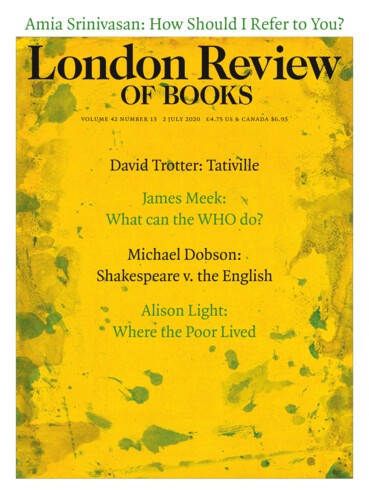Spring
So much of this is reflex; placed on a polystyrene sphere,
the female cricket scrambles towards a recording of the male,
her legs pedalling desperately, like an elephant on a ball,
steering towards the bright itch of his song
before her brain even has time to register the chirr.
Look at the crickets now, stacked up in boxes in this lab,
the strip lights an incipient migraine, temperature steadily
Mediterranean, fans and generators whirring ...
The crickets’ prehensile antennae test the air, twirling like ribbons,
retracting like whips, whirling, probing, sipping –
strange tongues that latch to a particular taste;
how receptive they are, how tenderly ready.
The females hear the males stacked in their Tupperware tenements,
and wheel and wheel again, pivoting towards them.
We maybe think we’re different, but in the hot box of the lab
a stranger turned the cricket in my palm – briefest graze
of his finger on my skin – and I felt it then –
I who have been in love with the same brave man for years
felt it nevertheless, that giddy inwards swoop, its pheromone wash
its compulsion, and I turned away confused
by that sexual shiver, its tremble down my spine –
my body now at forty a lit fuse, a gorgeous fluorescent yes,
helplessly ready (touch me I need to be touched);
at night I incandesce, my T-shirt soaked
and clinging to my skin – oh my body is a beacon,
it is panicking, it is screaming – it thinks
we have not done enough to ensure the survival
of the human race – it remembers plague, it remembers infant death –
it knows we’re running out of time and is extravagant,
bountiful with eggs, I might have triplets, twins ...
As my cycle ends my body mourns and takes me with her –
whole days I want to curl round my two girls
and hold them from the catastrophic world – though of course
they won’t be held, and my body won’t be reassured –
goaded by DNA, its will to merge and replicate,
merge and replicate, its gorgeous living chain.
Late Summer
When I return to the lab – that hot metal box parked like a caravan
in the Du Maurier wing, I’m too late even for the most persistent singers.
There’s a clear plastic bag stuffed with torn egg-box habitats
and dead crickets. The last few plastic tubs are waiting to be decanted,
their inhabitants keeled over, shunted face down in corners,
genuflecting to some dark immersive power, or plain damn tired.
Back in March the females had been laying eggs;
I watched one insert the slim tube of her ovipositor into sand
and hit the bottom of the plastic tub and felt it in my body,
like some blunt, uterine nerve, some dull touch; and now,
spent shells, debris, while beside them in the tenements
the young are teeming, testing the clear plastic edges of their boxes,
scuttling, casting their skins and hardening off, and I begin
to be sickened, I begin to be dizzied by the whole whirling circuit,
these desperate spells of singing and fucking and laying and death,
the males’ harp and file, sawing the tines of one wing across the other,
its manic orchestra, all this appetite and instinct and secretion of eggs
– to come to what? The survival of a particular way of being?
A microchip passed through endless collaborations,
gaining or losing significant traits, an endlessly augmenting dish?
My single self sickens, understanding itself
as slave to DNA – all the blood-flesh agonies of love
to end as a husk on your knees as I’m now on my knees –
something about how the crickets contract in death, and the heat,
and my own lack of volition, desire and its plenitude,
how I sleep foetally like the dead crickets, their legs drawn in
as if invisibly trussed, and the twirling aerials of the young
testing the limits of their boxes, and all of us in tenements,
in limits, oblivious and captive, all of us messengers –
we think we have meaning but already biology has done with us . . .
Yet look in this tarnished frame: this stalwart little girl
could be either my mother or my daughter Rose – the same stance
the same rogue look – and I bear the message
of both my grandmothers’ bodies.
Think of that butterfly migration across oceans and deserts
completed in stages – how each butterfly undertakes
a section of the journey, then lays its eggs and dies
and the caterpillars feed, pupate and hatch, then fly the next stage,
a sort of relay across the honeyed distances, across time,
on endlessly repatterning wings; how much I love the meadow
turning under them, its tapestry of grass and wort and vetch
stitching and restitching green, its endlessly mutating song.
Send Letters To:
The Editor
London Review of Books,
28 Little Russell Street
London, WC1A 2HN
letters@lrb.co.uk
Please include name, address, and a telephone number.

